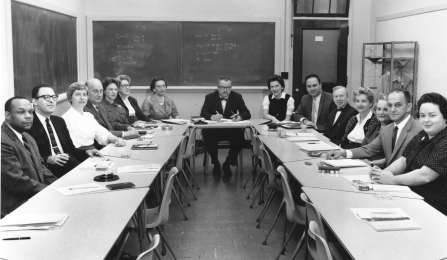Our History
"Living Proof: Reflections on 75 Years of Social Work Education" captures the first 75 years of our history. In partnership with Odessa Pictures, Denise Krause, Susan Green and staff filmed about 60 interviews with alumni, former deans, UB presidents and faculty members for the documentary.
Niles Carpenter came to UB in 1924 as head of the Sociology Department. He wasn’t expecting additional responsibilities, but Carpenter went right to work when asked to start a school of social work.
Within two years, UB began offering social work courses, and by 1934, the Association of Schools of Social Work (AASSW) approved our first certificate program — the beginning of what we know today as the UB School of Social Work.
Two years later, UB offered a second post-graduate year of social work education.
Continued growth
The modern face of the school reflects our progressive creation and vision:
- About 650 graduate students now study in a broad array of programs, including a full- and part-time Master of Social Work (MSW), Doctor of Social Work (DSW) and PhD programs, as well as dual degree programs leading to MSW/PhD, JD/MSW, MBA/MSW, MPH/MSW or BA/MSW degrees.
Additional highlights:
- In 2019, the School of Social Work admitted our first cohort for the online DSW program — the first DSW program in SUNY and the region. The DSW educates students to use implementation science to translate research into best practice interventions, while identifying barriers and enablers of effective treatment.
- In 2013, we began the part-time, online MSW program, empowering more people from a wider geography to access our faculty and curriculum.
- Since the creation of our PhD in Social Welfare program in 1994, it has averaged 25 students annually, with 90% of graduates attaining faculty research positions.

Social Work faculty and staff, 1961
Community commitment
Our comprehensive degree program offerings are reinforced by our commitment to broaden community-based research:
- We formed the Buffalo Center for Social Research (BCSR) in 2005 by merging the former Center for Research on Urban Social Work Practice and the Research Center for Children and Youth.
- BCSR is now located in Parker Hall on UB’s South Campus. It's also home to several research institutes, including the Behavioral Health Data Analytics Collaborative, Immigrant and Refugee Research Institute, Institute for Sustainable Global Engagement, and Institute on Trauma and Trauma-Informed Care.
- Formalized in 2010, the UB/Amrita Social and Behavioral Sciences Research Institute aims to “initiate, encourage, support and conduct interdisciplinary joint research in the social and behavioral sciences as it relates to identified areas of need, such as HIV/AIDS, trauma, extreme events and disaster management, community development, mental health and alcohol abuse.”
- Since 1990, our Behavioral Health Clinic has helped more than 5,000 people from Western New York through a variety of no-cost, research-based treatment programs.
Trauma-informed and human rights perspectives
In 2009, the school officially adopted trauma-informed and human rights perspectives in social work education, policy and practice. Our Institute on Trauma and Trauma-Informed Care (ITTIC), established in January 2012, has quickly become an integral part of studying and disseminating those perspectives in the school and throughout the community.
By adding these lenses to current methods, social work students can:
- Increase their knowledge base
- Heighten their awareness of trauma-informed care
- Gain a deeper understanding of both issues and clients
Today, we maintain full accreditation with the Council on Social Work Education (CSWE) and are ranked among the top 10% of social work programs in the nation, according to U.S. News & World Report.

